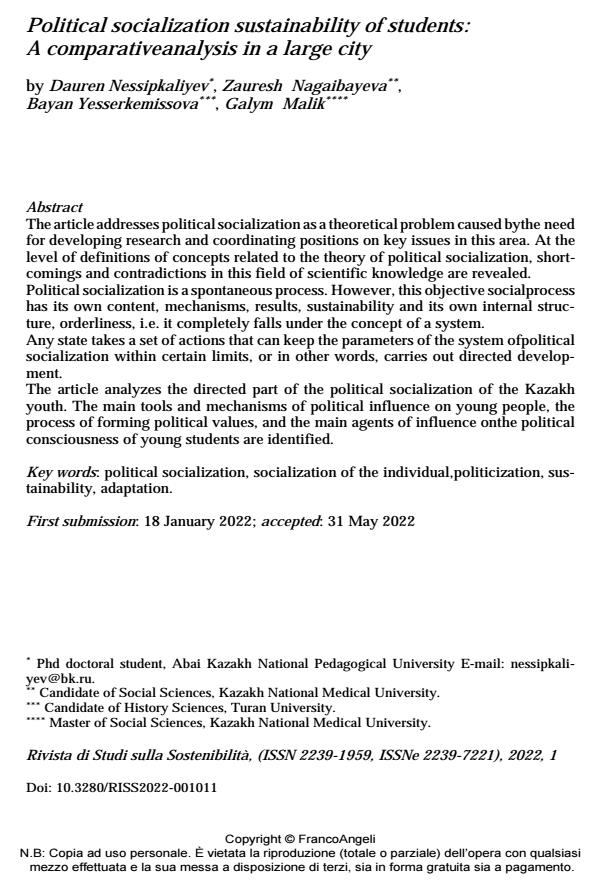Political socialization sustainability of students: A comparative analysis in a large city
Titolo Rivista RIVISTA DI STUDI SULLA SOSTENIBILITA'
Autori/Curatori Dauren Nessipkaliyev, Zauresh Nagaibayeva, Bayan Yesserkemissova, Galym Malik
Anno di pubblicazione 2022 Fascicolo 2022/1
Lingua Inglese Numero pagine 11 P. 181-191 Dimensione file 45 KB
DOI 10.3280/RISS2022-001011
Il DOI è il codice a barre della proprietà intellettuale: per saperne di più
clicca qui
Qui sotto puoi vedere in anteprima la prima pagina di questo articolo.
Se questo articolo ti interessa, lo puoi acquistare (e scaricare in formato pdf) seguendo le facili indicazioni per acquistare il download credit. Acquista Download Credits per scaricare questo Articolo in formato PDF

FrancoAngeli è membro della Publishers International Linking Association, Inc (PILA), associazione indipendente e non profit per facilitare (attraverso i servizi tecnologici implementati da CrossRef.org) l’accesso degli studiosi ai contenuti digitali nelle pubblicazioni professionali e scientifiche.
The article addresses political socialization as a theoretical problem caused by the need for developing research and coordinating positions on key issues in this area. At the level of definitions of concepts related to the theory of political socializa-tion, shortcomings and contradictions in this field of scientific knowledge are re-vealed. Political socialization is a spontaneous process. However, this objective social pro-cess has its own content, mechanisms, results, sustainability and its own internal structure, orderliness, i.e. it completely falls under the concept of a system. Any state takes a set of actions that can keep the parameters of the system of po-litical socialization within certain limits, or in other words, carries out directed de-velopment. The article analyzes the directed part of the political socialization of the Kazakh youth. The main tools and mechanisms of political influence on young people, the process of forming political values, and the main agents of influence on the politi-cal consciousness of young students are identified.
Parole chiave:political socialization, socialization of the individual, politicization, sus-tainability, adaptation.
Dauren Nessipkaliyev, Zauresh Nagaibayeva, Bayan Yesserkemissova, Galym Malik, Political socialization sustainability of students: A comparative analysis in a large city in "RIVISTA DI STUDI SULLA SOSTENIBILITA'" 1/2022, pp 181-191, DOI: 10.3280/RISS2022-001011